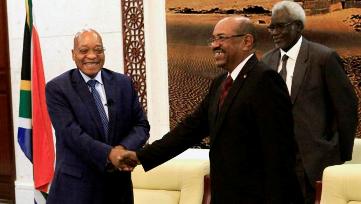Bashir & Zuma agree to coordinate on ICC: state media
September 3, 2015 (KHARTOUM) – The Sudanese president Omer Hassan al-Bashir held talks with his South African counterpart Jacob Zuma on the sidelines of the WWII victory celebrations in Beijing and have agreed on a plan to confront challenges facing Africa top of them is the issue of the International Criminal Court (ICC), state media reported.

Sudanese foreign minister told official news agency (SUNA) that Zuma accepted Bashir’s invitation to visit Khartoum by the end of this year or early next year.
The report did not elaborate on what they decided in terms of ICC. The South African presidency’s separate statement said that sixteen bilateral agreements have been concluded between the two countries since February.
“South Africa seeks to further strengthen cooperation with Sudan in the fields of agriculture, agro-processing, science and technology, energy, infrastructure development, mining and retail.”
South African government came into the spotlight last June after it hosted Bashir despite an ICC warrant for him and even ignored a local court order barring his arrest.
Zuma defended his government’s decision not to apprehend Bashir saying he was invited by the African Union (AU).
“He is the guest of the AU,” Zuma told Democratic Alliance (DA) opposition MP’s who demanded an explanation in parliament last month.
The issue has triggered tensions between Zuma and the judiciary amid attacks directed by the ruling African National Congress (ANC) to judges.
The attacks came after the North Gauteng High Court ruled that government had broken the law by allowing Bashir to leave the country despite orders banning his departure pending a decision on his arrest.
The court reprimanded the government for flouting its own laws saying that they undermined the country’s constitutional democracy in allowing Bashir’s exit.
“A democratic State based on the rule of law cannot exist or function, if the government ignores its constitutional obligations and fails to abide by Court orders. A Court is the guardian of justice, the corner-stone of a democratic system based on the rule of law. If the State, an organ of State or State official does not abide by Court orders, the democratic edifice will crumble stone-by-stone until it collapses and chaos ensues,” presiding Judge Dunstan Mlambo said at the time.
Mlambo also invited the National Director of Public Prosecutions (NDPP) “to consider whether criminal proceedings are appropriate”.
The government said that it may consider withdrawing from the ICC after exhausting all other remedial measures.
(ST)
